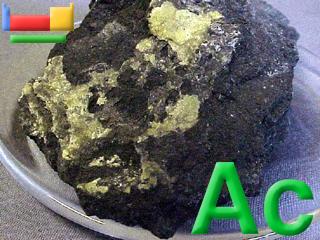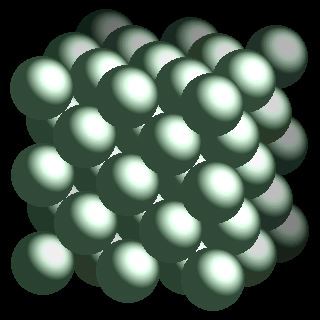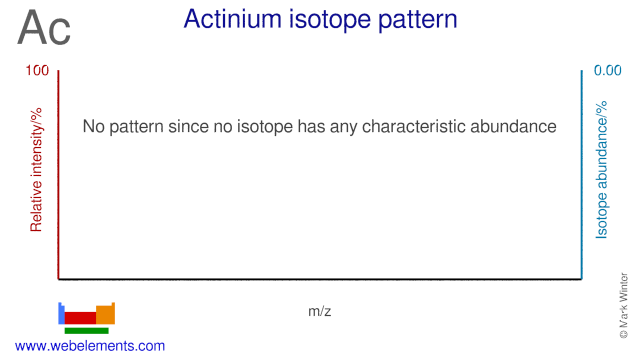Actinium - 89Ac: the essentials
- Name: actinium
- Symbol: Ac
- Atomic number: 89
- Relative atomic mass (Ar): [ 227.03 ] (longest lived isotope)
- Standard state: solid at 298 K
- Appearance: silvery
- Classification: Metallic
- Group in periodic table:
- Group name: Actinoid
- Period in periodic table: 7 (actinoid)
- Block in periodic table: f
- Shell structure: 2.8.18.32.18.9.2
- CAS Registry: 7440-34-8
Actinium atoms have 89 electrons and the shell structure is 2.8.18.32.18.9.2. The ground state electronic configuration of neutral actinium is [Rn].6d1.7s2 and the term symbol of actinium is 2D3/2.
Actinium: description
Actinium is dangerously radioactive. The chemical behaviour of actinium is similar to that of the rare earths, particularly lanthanum. It is found naturally in uranium ores and actinium is 150 times more radioactive than radium.

This sample of uraninite contains some about 10-9 grammes of actinium at any one time. Image adapted with permission from Prof James Marshall's (U. North Texas, USA) Walking Tour of the elements CD.
Actinium: physical properties
Density of solid: 10070 kg m-3
Molar volume: 22.55 cm3
Thermal conductivity: 12 (estimate) W m‑1 K‑1
Actinium: heat properties
Melting point: 1323 [1050 °C (1922 °F)] K
Boiling point: 3573 [3300 °C (5972 °F)] K
Enthalpy of fusion: 20.5 kJ mol-1
Actinium: atom sizes
Atomic radius (empirical): 195 pm
Molecular single bond covalent radius: 186 (coordination number 3) ppm
van der Waals radius: 283 ppm
Actinium: electronegativities
Pauling electronegativity: 1.1 (Pauling units)
Allred Rochow electronegativity: 1.00 (Pauling units)
Mulliken-Jaffe electronegativity: (no data)
Actinium: orbital properties
First ionisation energy: 519.11 kJ mol‑1
Second ionisation energy: 1134 kJ mol‑1
Third ionisation energy: 1682 kJ mol‑1
Actinium: abundances
Universe: (no data) ppb by weight
Crustal rocks: (no data) ppb by weight
Human: (no data) ppb by weight
Actinium: crystal structure

Actinium: biological data
Human abundance by weight: (no data) ppb by weight
Actinium has no biological role.
Actinium: uses
Actinium: reactions
Reactions of actinium as the element with air, water, halogens, acids, and bases where known.
Actinium: binary compounds
Binary compounds with halogens (known as halides), oxygen (known as oxides), hydrogen (known as hydrides), and other compounds of actinium where known.
Actinium: compound properties
Bond strengths; lattice energies of actinium halides, hydrides, oxides (where known); and reduction potentials where known.
Actinium: history
Actinium was discovered by Andre Debierne in 1899 at France. Origin of name: from the Greek word "aktinos" meaning "ray".Actinium: isotopes

Actinium: isolation
Isolation: coming soon!
